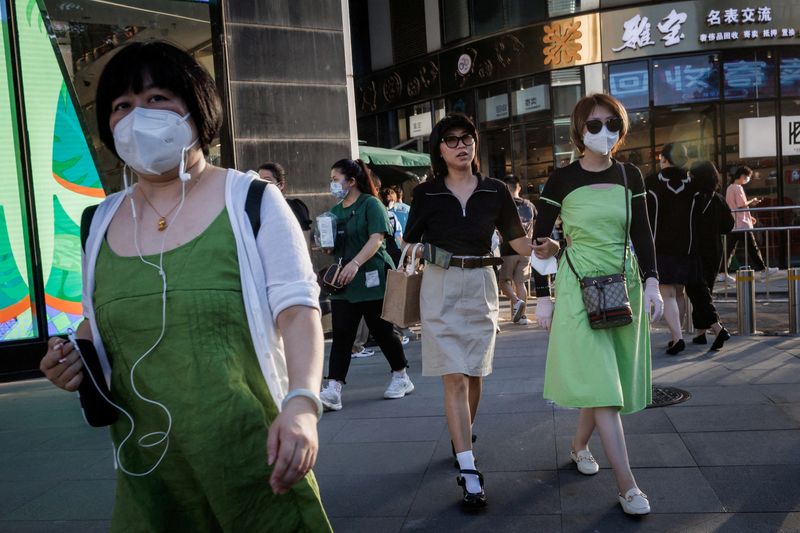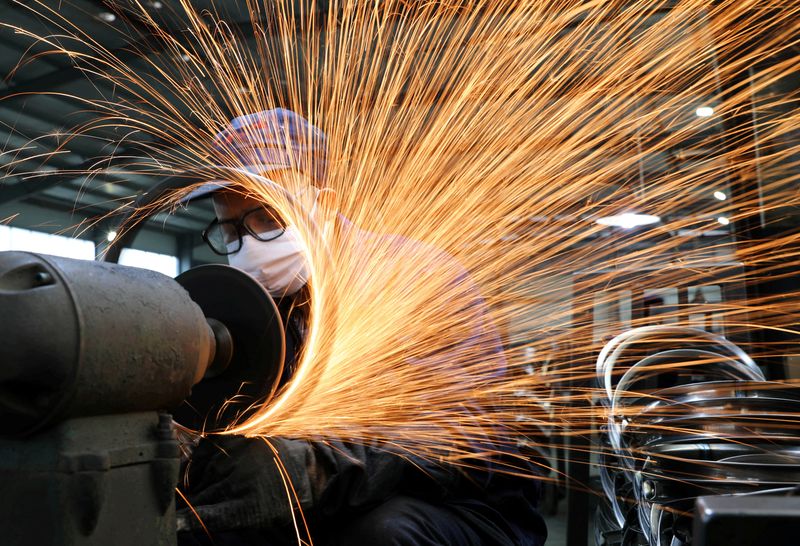By Ellen Zhang and Joe Cash
BEIJING (Reuters) -China's April industrial output and retail sales growth undershot forecasts, suggesting the economy lost momentum at the beginning of the second quarter and intensifying pressure on policymakers to shore up a wobbly post-COVID recovery.
Tuesday's batch of data, which also showed a further decline in property investment, adds to concerns about the outlook for the world's second-biggest economy as both its domestic and export engines of growth remain underpowered.
Industrial output grew 5.6% in April from a year earlier, accelerating from the 3.9% pace seen in March, data released by the National Bureau of Statistics (NBS) showed. It was well below expectations for a 10.9% increase in a Reuters poll of analysts although it marked the quickest growth rate since September 2022.
Retail sales, a gauge of consumption, jumped 18.4%, up sharply from a 10.6% increase in March for their fastest increase since March 2021. Analysts had expected 21.0% growth.
The year-on-year figures were heavily skewed by contractions last April when the financial hub of Shanghai and other major cities were under stringent anti-virus lockdowns and curbs, which severely impacted growth in the Asian giant in 2022.
"Today's weaker-than-expected data show how difficult it is to keep the growth engine running after restarting it," said Bruce Pang, chief economist at Jones Lang Lasalle (NYSE:JLL).
Nomura economists took an even dimmer view: "As disappointment kicks in, we see a rising risk of downward spiral, resulting in weaker activity data, rising unemployment, persistent disinflation, falling market interest rates and a weaker currency."
"Year-over-year growth in Q2 may still look elevated, thanks to a low base, but sequential growth could experience a material decline," they said.
POLICY SUPPORT
Indeed, other data over the past week showing shrinking imports in April, deepening factory gate deflation and worse-than-expected bank loans signalled weak domestic demand, raising pressures on policymakers to shore up the economic recovery as global growth falters.
China's central bank kept the interest rate unchanged on Monday as expected, but markets are betting on more monetary easing in the coming months as the commodities data also highlighted pockets of weakness across the economy.
The country's average daily coal production, aluminium output and crude steel output all fell in April from a month earlier.
Zhou Hao, economist at Guotai Junan International, expects the central bank to cut interest rates "as economic downturn pressure still remains."
China's cabinet in late April unveiled plans to boost employment and trade as the government tries to meet its modest growth target of about 5% in 2023, after badly missing last year's goal.
OUT OF 'SWEET SPOT'
The offshore Chinese yuan weakened towards a two-month low while the Aussie dollar flipped from early small gains to a loss after the discouraging data.
On top of the broad demand woes, Chinese policymakers have to contend with headwinds from recent Western bank failures, rising global borrowing costs, high domestic debt and the Ukraine war.
The data also showed fixed asset investment expanded 4.7% in the first four months of 2023 year-on-year, slowing from the 5.1% pace in the January-March period.
Private fixed-asset investment rose only 0.4%, a sharp contrast to the 9.4% jump in investment by state entities, indicating weak business confidence.
Investment in the property sector, a key pillar of the economy, tumbled 16.2% year-on-year last month after a 7.2% drop in March, according to Reuters' calculations based on official data, as investors remain cautious due to still-fragile demand.
Hiring was still low among companies wary about their finances. The youth jobless rate hit a record high at 20.4%, up from 19.6% in March, which Zhiwei Zhang, chief economist at Pinpoint Asset Management, described as a "worrying sign."
"With China now out of the sweet spot of reopening, hope of further sentiment repair could be diminishing in the absence of decisive government actions," Citi economists said in a note.

"We reckon that policymakers need to move from the wait-and-see mode to proactive easing and expect 20bps policy rate cut in the remainder of the year."
($1 = 6.9121 Chinese yuan renminbi)
